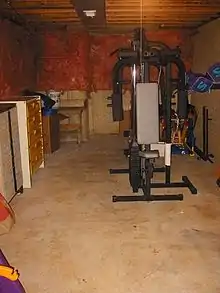Professional organizing
Professional organizing emerged as an industry in 1984 within Los Angeles.[1] A professional organizer assists individuals and businesses to improve their organizing systems and process.


This industry has been popularized by a number of television programs produced on the subject, beginning with Life Laundry in 2002. This was followed by other programs, such as Clean Sweep, Neat, Mission: Organization, Tidying Up with Marie Kondo and Hot Mess House.
Professional Organizing around the world
Professional Organizing is represented globally by the International Association of Professional Organizing Associations (IFPOA). Its members are not for profit membership bodies with at least 100 members and have operated as a membership body for professional organizers for at least 3 years. As at December 2019, IFPOA comprises the following membership bodies for industry professionals:
- Brazil: Associação Nacional de Profissionais de Organização e Produtividade (ANPOP)
- Canada: Professional Organizers in Canada (POC)
- Italy: Associazione Professional Organizers Italia (APOI)
- Japan: Japanese Association of Life Organizers (JALO)
- Republic of Korea: Korea Association of Professional Organizers (KAPO)
- Netherlands: Nederlands Beroepsvereniging van Professional Organizers (NBPO)
- United Kingdom: Association of Professional Declutterers & Organisers (APDO)
- United States: Institute for Challenging Disorganization (ICD)
- United States: National Association of Productivity & Organizing Professionals (NAPO)
Definitions
NAPO defines Professional Organizer and Productivity Consultant as follows:[1]
- A Professional Organizer supports evaluation, decision-making, and action around objects, space, and data; helping clients achieve desired outcomes regarding function, order, and clarity.
- A Productivity Consultant supports evaluation, decision-making, and action around time, energy, and resources; helping clients achieve desired outcomes regarding goals, effectiveness, and priorities.
Certifications and Credentials
Certified Professional Organizers (CPOs) have proven industry proficiency by demonstrating they possess the body of knowledge and experience essential to professional organizing and productivity consulting. The CPO® credential identifies professional organizers who've documented a specific number of paid hours that include transferring organizing skills to the client, and passed the Board of Certification for Professional Organizers (BCPO®) examination. The credential provides the organizing and productivity industry a way to elevate its professional standards.[2]
The National Association of Productivity and Organizing Professionals' education arm is known as NAPO University. Currently NAPO University offers six Specialist Certificates: Residential Organizing, Workplace Productivity, Team Productivity, Life Transitions, Household Management and Brain-Based Conditions. NAPO University also offers a Business Resources Track to support Professional Organizers and Productivity Consultants in developing and growing their businesses.
Principles
Professional Organizers achieve the goal of creating and maintaining organizational systems by teaching others the basic principles of organization. Writer Julie Morgenstern suggests communicating these principles by using the acronym "SPACE", interpreted as: S=Sort, P=Purge, A=Assign a Home, C=Containerize and E=Equalize.[3] The last step ("E") consists in monitoring how the new system that has been created is working, adjusting it if needed, and maintaining it. This principle is applicable to every type of organization.
As one of their main jobs, Professional Organizers help clients reduce excessive clutter (paper, books, clothing, shoes, office supplies, home decor items, etc.) in the home or in the office.[4]
Professional Organizers offer a wide variety of services, from designing a functional closet, to organizing a cross-country move. For homeowners, a Professional Organizer might plan and reorganize the space of a room, improve paper management, or coach in time-management, or goal-setting. In a business setting, Professional Organizers work closely with their clients to increase productivity by stream-lining paper-filing, electronic organization, and employee time-management.[5]
See also
References
- "About NAPO – National Association of Productivity and Organizing Professionals (NAPO)". www.napo.net. Retrieved 2018-01-22.
- "Board of Certified Professional Organizers".
- Julie Morgenstern (1 September 2004). Organizing from the Inside Out, second edition: The Foolproof System For Organizing Your Home, Your Office and Your Life. Henry Holt and Company. p. 22. ISBN 978-1-4299-5536-2.
- Buck, Claudia (February 3, 2013). "Personal Finance: It's time to tame paper tiger". The Sacramento Bee. Archived from the original on 13 May 2013. Retrieved June 3, 2013.
- "Our Profession". Retrieved 14 April 2013.
External links
- New York Times article on using professional organizing services.